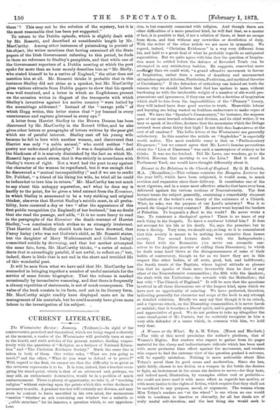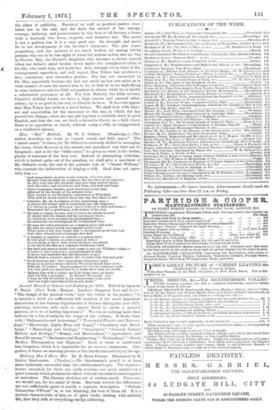A Woman at the Wheel. By A. M. Tobyn. (Hurst
and Blackett.) —The title of this novel proclaims the author's platform, that of Woman's Rights. But readers who expect to gather from its pages material for the cheap and indiscriminate ridicule which has been used with more profusion than effect against the movement, and readers who expect to find the extreme view of the question pushed a out rance, will be equally mistaken. Nothing is more noticeable about Miss Tobyn's novel than its good sense and moderation. Since she has, quite fairly, chosen to use fiction as a weapon in the battle she desires to fight, an instrument in the cause she desires to serve—for they bear, and indeed need, illustration, by examples either real or probable— she could not have used it with more effect as regards her motive, or with more justice to the rights of fiction, which require that they shall not be sacrificed to any purpose, moral, or argument. The woman whom Miss Tobyn's readers see "at the wheel" is one whom no one would wish to condemn to inaction or obscurity, for all her deeds are of truly useful self-devotion, and the last thing she would seek is the glare of publicity. Practical as well as poetical justice over- takes her in the end, and she finds the reward of her energy, courage, industry, and perseverance in the best of all havens, a home with a husband who loves, respects, and deserves her. The novel is not a perfect, but it is a very good one. Its strength and merit lie in the development of the heroine's character. The plot wants proportion, and the interest is too much broken up among trivial persons who are to be lost sight of when the serious action sets in ; but in Cherrie May, the Doctor's daughter, who becomes a doctor herself when her father's mind breaks down under the complicated trials of his life, who tends him, and heals her sick, through every kind of dis- couragement, opposition, and evil report, Miss Tobyn has produced a fine, consistent, and attractive picture. She has not succeeded in Dr. May, apparently because she had not made up her own mind as to what manner of man she meant him to be, so that he is too high-flying in some instances and too little scrupulous in others, while he is hardly a substantial personage at all. For Con Doherty, the Irish servant, Cherrie's faithful friend, we have a high esteem and amused admi- ration; he is as good in his way as Chorrie in hers. It does not appear that Miss Tobyn has written a novel before. We shall look with inter- est and expectation for the successor to this ono, in which she has proved two things,—that she can put together a readable story in good English, and that she can set forth a favourite theory on a field where there is no opposition or check, without using a silly, an exaggerated, or a vindictive phrase.







































 Previous page
Previous page